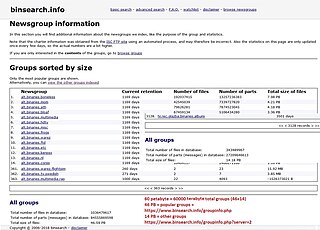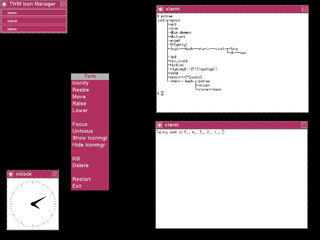A frequently asked questions (FAQ) list is often used in articles, websites, email lists, and online forums where common questions tend to recur, for example through posts or queries by new users related to common knowledge gaps. The purpose of a FAQ is generally to provide information on frequent questions or concerns; however, the format is a useful means of organizing information, and text consisting of questions and their answers may thus be called a FAQ regardless of whether the questions are actually frequently asked.
A Usenet newsgroup is a repository usually within the Usenet system, for messages posted from users in different locations using the Internet. They are discussion groups and are not devoted to publishing news. Newsgroups are technically distinct from, but functionally similar to, discussion forums on the World Wide Web. Newsreader software is used to read the content of newsgroups.
The Great Renaming was a restructuring of Usenet newsgroups that took place in 1987. B News maintainer and UUNET founder Rick Adams is generally considered to be the initiator of the Renaming.

A news server is a collection of software used to handle Usenet articles. It may also refer to a computer itself which is primarily or solely used for handling Usenet. Access to Usenet is only available through news server providers.
Interpedia was one of the first-proposed online encyclopedia which would allow anyone to contribute by writing articles and submitting them to the central catalogue of all Interpedia pages.

The alt.* hierarchy is a major class of newsgroups in Usenet, containing all newsgroups whose name begins with "alt.", organized hierarchically. The alt.* hierarchy is not confined to newsgroups of any specific subject or type, although in practice more formally organized groups tend not to occur in alt.*. The alt.* hierarchy was created by John Gilmore and Brian Reid.
alt.sex is a Usenet newsgroup – a discussion group within the Usenet network – relating to human sexual activity. It was popular in the 1990s. An October 1993 survey by Brian Reid reported an estimated worldwide readership for the alt.sex newsgroup of 3.3 million, that being 8% of the total Usenet readership, with 67% of all Usenet "nodes" carrying the group. At that time, alt.sex had an estimated traffic of 2,300 messages per month.
Jim Hall is a computer programmer and advocate of free software, best known for his work on FreeDOS. Hall began writing the free replacement for the MS-DOS operating system in 1994 when he was still a physics student at the University of Wisconsin-River Falls. He remains active with FreeDOS, and is currently the coordinator for the project.

twm is a window manager for the X Window System. Started in 1987 by Tom LaStrange, it has been the standard window manager for the X Window System since version X11R4. The name originally stood for Tom's Window Manager, but the software was renamed Tab Window Manager by the X Consortium when they adopted it in 1989. twm is a stacking window manager that provides title bars, shaped windows and icon management. It is highly configurable and extensible.
The Breidbart Index, developed by Seth Breidbart, is the most significant cancel index in Usenet.
Crossposting is the act of posting the same message to multiple information channels; forums, mailing lists, or newsgroups. This is distinct from multiposting, which is the posting of separate identical messages, individually, to each channel,. Enforcement actions against crossposting individuals vary from simple admonishments up to total lifetime bans. In some cases, on email lists and forums, an individual is put under a stealth ban where their posts are distributed back to them as if they were being distributed normally, but the rest of the subscribers are not sent the messages. This is easily detected if the Stealthed individual has two different, and totally non-associated identities in the channel, such that the non-stealthed identity will see a different set of messages, lacking the posts of the stealthed individual, in their view of the channel.
The RISKS Digest or Forum On Risks to the Public in Computers and Related Systems is an online periodical published since 1985 by the Committee on Computers and Public Policy of the Association for Computing Machinery. The editor is Peter G. Neumann.
Usenet II was a proposed alternative to the classic Usenet hierarchy, started in 1998. Unlike the original Usenet, it was peered only between "sound sites" and employed a system of rules to keep out spam.
The sci.* hierarchy is a major class of newsgroups in Usenet, containing all newsgroups whose name begins with "sci.", organized hierarchically.
The Big 8 are a group of newsgroup hierarchies established after the Great Renaming, a restructuring of Usenet that took place in 1987. These hierarchies are managed by the Big 8 Management Board. Groups are added through a process of nomination, discussion and voting.

Conversation threading is a feature used by many email clients, bulletin boards, newsgroups, and Internet forums in which the software aids the user by visually grouping messages with their replies. These groups are called a conversation, topic thread, or simply a thread. A discussion forum, e-mail client or news client is said to have a "conversation view", "threaded topics" or a "threaded mode" if messages can be grouped in this manner. An email thread is also sometimes called an email chain.

The Tanenbaum–Torvalds debate was a written debate between Andrew S. Tanenbaum and Linus Torvalds, regarding the Linux kernel and kernel architecture in general. Tanenbaum, the creator of Minix, began the debate in 1992 on the Usenet discussion group comp.os.minix, arguing that microkernels are superior to monolithic kernels and therefore Linux was, even in 1992, obsolete. The debate has sometimes been considered a flame war.
Control messages are a special kind of Usenet post that are used to control news servers. They differ from ordinary posts by a header field named Control. The body of the field contains control name and arguments.
Ralf Brown's Interrupt List is a comprehensive list of interrupts, calls, hooks, interfaces, data structures, CMOS settings, memory and port addresses, as well as processor opcodes and special function registers for x86 machines from the 1981 IBM PC up to 2000, most of it still applying to IBM PC compatibles today.

Usenet, USENET, or, "in full", User's Network, is a worldwide distributed discussion system available on computers. It was developed from the general-purpose Unix-to-Unix Copy (UUCP) dial-up network architecture. Tom Truscott and Jim Ellis conceived the idea in 1979, and it was established in 1980. Users read and post messages to one or more topic categories, known as newsgroups. Usenet resembles a bulletin board system (BBS) in many respects and is the precursor to the Internet forums that have become widely used. Discussions are threaded, as with web forums and BBSes, though posts are stored on the server sequentially.





